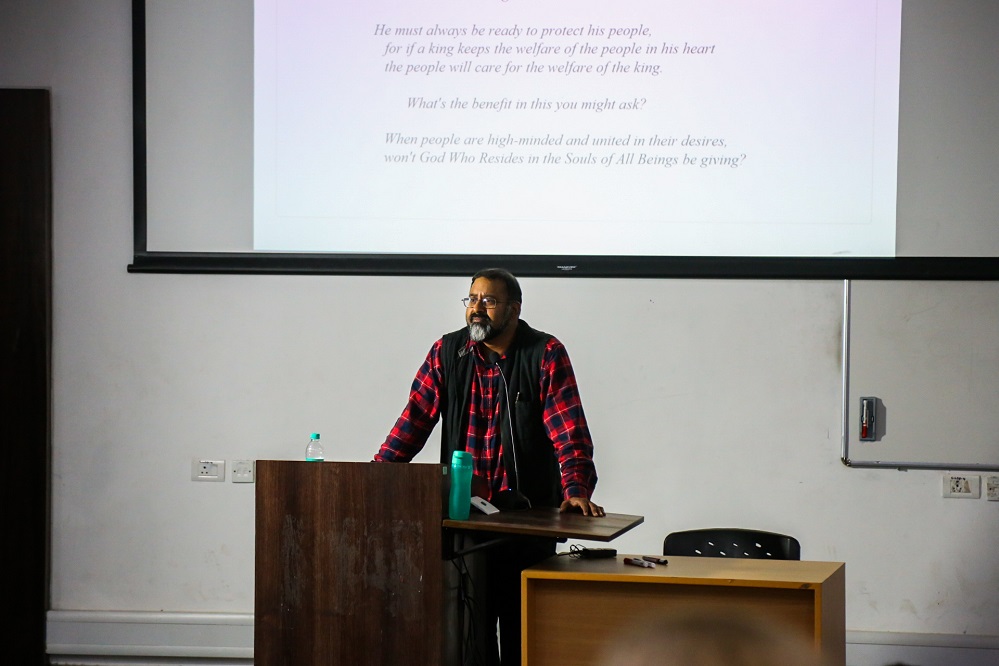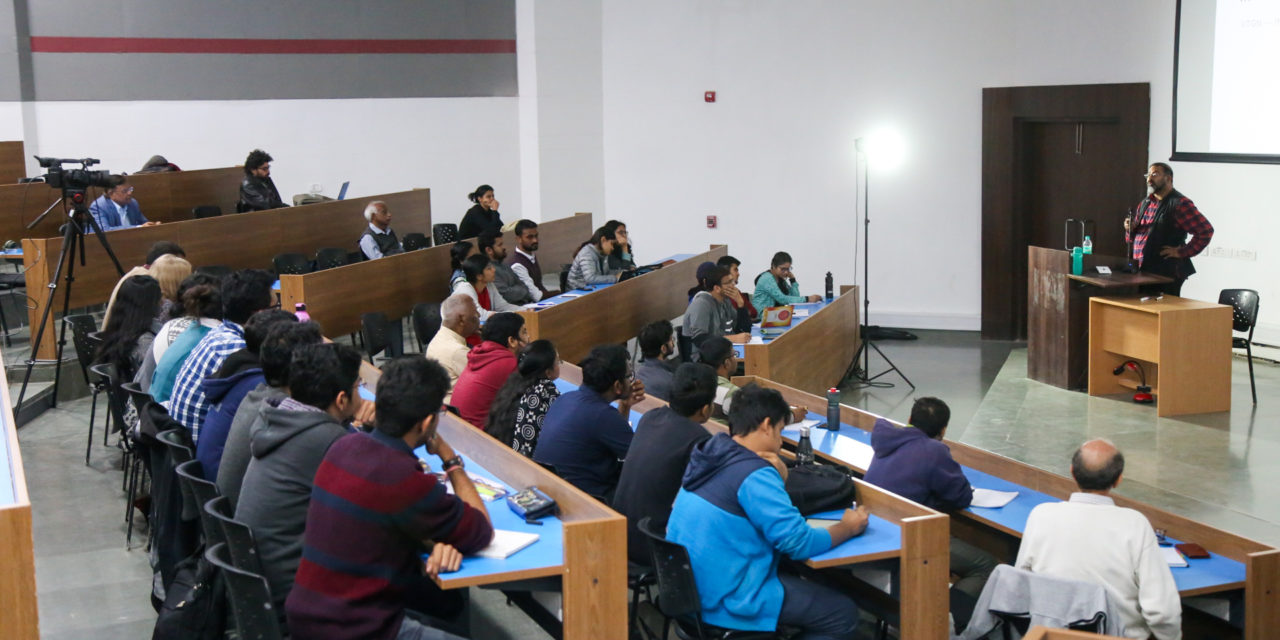“India is the cradle of the human race, the birthplace of human speech, the mother of history, the grandmother of legend, and the great grandmother of tradition.” – Mark Twain, renowned writer, humorist, entrepreneur, publisher, and lecturer

India is famous across the globe for its rich scientific, intellectual, and artistic knowledge traditions. To inculcate among students a deeper understanding of the classical thought-practices and cultures of Indian civilization through the perspective of an insider, the Humanities and Social Sciences discipline at the Indian Institute of Technology Gandhinagar initiated in the year 2016 a semester course titled Introduction to Indian Knowledge Systems (IKS). Taught by distinguished academicians invited from different parts of the country along with faculty members from the Institute, this course provides a rare opportunity to interact with experts and gain an idea of shared Indian concepts and practices in diverse fields. These range from the polity, governance, arts, literature, geography, and pilgrimage, all the way to ecology, sciences, religion, and technologies, among other knowledge systems.
The first edition of the IKS course was conducted from January to April 2016. It offered a panorama of India’s intellectual, literary, scientific, technological, and artistic traditional aspects, with an emphasis on the country’s philosophical and ethical systems, medicine, classical science, agriculture, and performing arts, among others. Talks, field trips and sessions by eminent scholars viz., Sashikala Ananth (Vastu Shilpa Shastras), VN Jha (Indian Philosophy), Rama Jayasundar (Ayurveda), MD Srinivas (Indian Traditions of Science), K Ramasubramanian (Sanskrit and Science), AV Balasubramanian (Agriculture and Knowledge Systems), Chithra Madhavan (Temples Architecture and Indian Sculpture), Michel Danino (Town-planning and Administration) and Lakshmi Sreeram (Dance, Music, and Theatre), were the main attractions.
The year 2017 saw the second installment of this course on the theme — how the ancient Indian society perceived and depicted itself. While modern research approaches the ancient Indian culture based on contemporary theories, IKS 2017 ventured to look at it on its own terms, analyzing data from diverse sources, such as epigraphy, archaeology, literature, and travelers’ accounts. Sessions by Kiran Kumar Thaplyal (Economic Guilds; Villages in ancient India; the Buddha and the impact of Buddhism), and Himanshu Prabha Ray (Archaeology and the Constitution of India; Fishing and sailing communities; Coastal monuments and cultural diversity; Inscriptions across the oceans) were interestingly educative.

Moreover, VN Prabhakar (Harappan Society), Susmita Basu Majumdar (Portrayal of Women), Suchandra Ghosh (Early Indian Everyday Life and Urban Culture), V Selvakumar (Archaeology, Literature and Society in South India), Srinivas Reddy (India through Bhakti Movement and Traveller’s Accounts), Michel Danino (Did Tribes Exist in Early Indian Society?) and Rita Kothari (Sufism in Sindh) delivered some thought-provoking lectures.
The third chapter of this course, held in 2019, focussed on an extensive range of ancient technologies of the country as a result of which the Indian civilization emerged as strong, dynamic and creative, and was able to adapt to the different situations and needs in the course of its long history. Some of the best specialists in the field spoke on the Harappan technologies, civil engineering, town planning, construction techniques, ceramic, water structures, metallurgy, acoustics, glass, textiles, and metrology. Sessions from RN Iyengar (Civil Engineering in Ancient India), Arun Menon (Structural Systems), K Krishnan (Archaeology of ceramics), Srinivas Veeravalli (Traditional science and engineering), Anurag Gupta (Indian musical instruments and acoustics), Janaki Turaga (India’s Textile Traditions), JS Kharakwal (Zinc production in ancient India ), SP Mehrotra (Iron and Steelmaking in Ancient India), Alok Kanungo (Ancient glass), Oishi Roy (Copper Technology) and Michel Danino (Non-Indian sources on Indian technologies) presented a deeper understanding of ancient Indian technologies.

The current edition of IKS, which started on 9th January 2020, aims to investigate the explanation of the ancient ‘idea of India.’ This India possesses shared practices and concepts which present a diffuse, fluid, adaptable, assimilative, but also real and distinctive pan-Indian identity. The course intends to explore some of these pan-Indian sub-themes, which contributed to the elaboration of the Indian civilization, and in the process, seeks to spread a deeper awareness of the country’s cultural integrity. Renowned speakers such as Neelkanth Chhaya, Michel Danino, Amita Sinha, Meenakshi Jain, Kapil Kapoor, Shonaleeka Kaul, Nanditha Krishna, Srinivas Reddy, Mana Shah, and MD Srinivas will provide insights on topics like Indian traditions of image worship and safeguarding, Pan-Indian intellectual traditions, Historical methods and traditions in early India, Sacred ecology across India, Pan-Indic concepts and practices of moral instruction, Pan-Indian traditions of pilgrimage and India’s sacred geography, to name a few.
This course is open to students from IIT Gandhinagar as well as from other educational institutions — anyone interested in studying Indian knowledge systems. They can join it for free by filling an online registration form on the website. Besides, videos of all lectures so far are being put online for continued viewing and build-up of a fund of knowledge on IKS.
“When the real history of India will be unearthed, it will be proved that, as in matters of religion, so in fine arts, India is the primal Guru of the whole world.” – Swami Vivekananda

